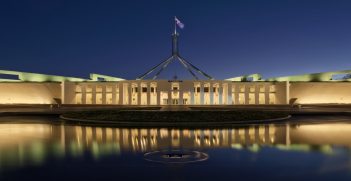12 January 2024: The Month in Australian Foreign Affairs

This month in Australian foreign affairs: 2023 Lowy Lecture, NZ PM Luxon visits, statement on Houthi attacks, earthquake in Japan, and more.
Prime Minister Anthony Albanese delivered the 2023 Lowy Lecture on 19 December 2023. He referred to the world as being “more economically connected than ever before – but also more politically fragmented”, noting “an ongoing land war in Europe”, “a conflict in the Middle East”, “climate change and the risk it presents to the stability of national economies, populations and borders” and “fundamental geopolitical change and intensifying strategic competition.” Albanese described his Government’s “approach to Australia’s foreign policy and our national security [as being] defined by a complementary focus on investing in our capabilities and investing in our relationships.” He emphasised that “what Australia says and does on the world stage matters – to our security, our prosperity, to the strength and stability of the region we call home” and that “it matters that we take our seat at the table and have our voice heard in the debate.” Albanese concluded by stating that “when our Government invests in Australia’s capability, when we invest in our relationships we are not seeking to hold back a changing world, or isolate ourselves from it. We are investing in Australia’s ability to shape the future – and to share in the benefits of change.”
On 20 December 2023, Albanese welcomed the Prime Minister of New Zealand, Christopher Luxon, to Australia. The trip was Luxon’s first official overseas visit, which Albanese said “demonstrates the closeness of the Australia-New Zealand partnership.”
Albanese issued a joint statement with his counterparts from the United States, Australia, Bahrain, Belgium, Canada, Denmark, Germany, Italy, Japan, Netherlands, New Zealand, Singapore, and the United Kingdom on 4 January 2024 on Houthi attacks against commercial vessels transiting the Red Sea. The leaders noted that “ongoing Houthi attacks in the Red Sea are illegal, unacceptable, and profoundly destabilising” and that “there is no lawful justification for intentionally targeting civilian shipping and naval vessels.” They further stated that “attacks on vessels, including commercial vessels, using unmanned aerial vehicles, small boats, and missiles, including the first use of anti-ship ballistic missiles against such vessels, are a direct threat to the freedom of navigation that serves as the bedrock of global trade in one of the world’s most critical waterways.” The leaders called for “the immediate end of these illegal attacks and release of unlawfully detained vessels and crews.”
On 2 January 2024, Albanese issued a statement on the earthquake in Japan. He stated that “the thoughts of Australians are with the people of Japan at this difficult time” and that “as close friends, we stand ready to support Japan to provide any necessary assistance.”
Deputy Prime Minister and Minister for Defence Richard Marles and Minister for Defence Industry Pat Conroy issued a joint statement on 15 December 2023 following the United States Congress’ passage of the 2024 National Defense Authorization Act. The Act includes “substantial enabling provisions for Australia’s AUKUS nuclear-powered submarine program.” Marles and Conroy noted that the Government “welcomes the significant and tangible steps the US Congress and the Biden Administration have taken to deliver on its commitment to both Pillar I and Pillar II of AUKUS.”
On 10 January 2024, Minister for Foreign Affairs Penny Wong issued a joint statement with over 40 of her counterparts on DPRK-Russia ballistic missile transfers. She joined her counterparts from Albania, Andorra, Argentina, Austria, Belgium, Bulgaria, Canada, Croatia, Cyprus, the Czech Republic, Denmark, Estonia, Finland, France, Georgia, Germany, Greece, Guatemala, Iceland, Ireland, Israel, Italy, Japan, Latvia, Liechtenstein, Lithuania, Luxembourg, Malta, Moldova, Monaco, Montenegro, the Netherlands, New Zealand, North Macedonia, Norway, Palau, Poland, Portugal, the Republic of Korea, Romania, San Marino, Slovenia, Spain, Sweden, Ukraine, and the United Kingdom, as well as the High Representative of the European Union and the Secretary of State of the United States of America. The statement “condemn[ed] in the strongest possible terms the Democratic People’s Republic of Korea’s (DPRK) export and Russia’s procurement of DPRK ballistic missiles, as well as Russia’s use of these missiles against Ukraine on December 30, 2023, and January 2, 2024.” It noted that “the transfer of these weapons increases the suffering of the Ukrainian people, supports Russia’s war of aggression, and undermines the global non-proliferation regime.” The Ministers emphasised their deep concern “about the security implications that this cooperation has in Europe, on the Korean Peninsula, across the Indo-Pacific region, and around the world.”
Wong and Conroy issued a statement on enhanced support for refugees globally on 16 December 2023, after the Government’s pledge of $265 million at the United Nations High Commissioner for Refugees-led Global Refugee Reform “to support refugees and to sustain humanitarian assistance in protracted crises.” The support includes $235 million to support displaced Rohingya and communities in need in Myanmar and Bangladesh, $20 million to support people in Afghanistan and those displaced to neighbouring countries, and $10 million to support people in Sudan and those displaced to neighbouring countries.
This is Isabella Keith’s last weekly column for Australian Outlook after nearly four years of writing ‘The Week in Australian Foreign Affairs’. Isabella is very grateful to have worked on this column consistently since its inception in 2020 and for the invaluable guidance and oversight of immediate past National President Allan Gyngell AO, who continues to be sorely missed. Australian Outlook’s Managing Editor, Dr Adam Bartley, will be taking over the column from next week.
Isabella Keith is a weekly columnist for Australian Outlook. She is also a Research Assistant, Sessional Academic, and Honours student in Law at the Australian National University, with a focus on international law. Isabella attended the AIIA #NextGen study tour to South Korea last year, and was also a delegate to the AIIA’s Australia-Korea-New Zealand and Australia-United States-Japan Policy Forums. She can be found on Twitter here.
This article is published under a Creative Commons License and may be republished with attribution.




